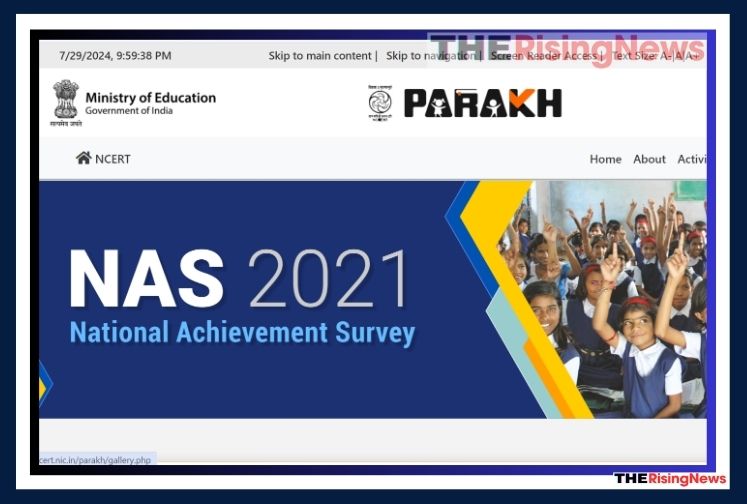NEW DELHI, July 29, 2024 — The National Council of Educational Research and Training (NCERT) PARAKH unit has released a groundbreaking analysis exposing significant variations in question paper standards across Indian state boards. This comprehensive study evaluates difficulty levels and cognitive demands of exam questions, highlighting disparities between rote learning and conceptual understanding approaches.
NCERT PARAKH Analysis
The NCERT PARAKH analysis reveals several crucial insights into the current state of board examinations in India:
1. Haryana’s Recall-Heavy Approach
The Board of Secondary Education Haryana (HBSE) stands out with 64.71% of questions focused on recall, indicating a heavy reliance on rote memorization.
2. UP Board’s Emphasis on Understanding
The Uttar Pradesh Madhyamik Shiksha Parishad (UPMSP) demonstrates a focus on understanding, with 87.76% of its questions requiring conceptual comprehension.
3. Chhattisgarh’s Varied Difficulty Levels
The Chhattisgarh Board of Secondary Education (CGBSE) presents a unique case, with 47.62% easy questions and 44.44% hard questions.
4. Tripura’s Challenging Approach
The Tripura Board of Secondary Education sets the bar high with 66.67% of its questions classified as hard.
Comparative Analysis of Question Paper Difficulties
To provide a clearer picture of the variations across state boards, here’s a breakdown of question difficulty percentages:
Easy Questions:
- Chhattisgarh Board: 47.62%
- Odisha Board: 40%
- CISCE: 38.39%
- Himachal Pradesh Board: 34.38%
- Tripura Board: 33.33%
Medium Questions:
- Uttarakhand Board: 97.44%
- Gujarat Board: 86.27%
- Kerala Board: 73.08%
- Punjab Board: 67.09%
- Nagaland Board: 59.2%
Hard Questions:
- Tripura Board: 66.67%
- Maharashtra Board: 53.57%
- Goa Board: 44.66%
- Chhattisgarh Board: 44.44%
- West Bengal Board: 33.33%
Impact on Student Learning and Future Prospects NCERT PARAKH
The NCERT PARAKH analysis underscores the critical need for a balanced approach in designing question papers. An over-reliance on recall-based questions can hinder students’ development of critical thinking and problem-solving skills, which are vital in today’s job market and higher education landscape.
Dr. Rajesh Kumar, an education policy expert, explains, “The disparity in question types across state boards creates an uneven playing field for students. Those from boards focusing on recall may struggle when faced with more conceptual challenges in higher education or competitive exams.”
Alignment with National Education Policy 2020
The findings align closely with the objectives of the National Education Policy (NEP) 2020, which advocates for a shift away from rote learning towards higher-order thinking skills and conceptual understanding.
Prof. Anita Sharma, a member of the NEP implementation committee, states, “This analysis provides concrete evidence of the need for reforms outlined in the NEP 2020. We must move towards a more uniform, conceptual understanding-based assessment system across all state boards.”
Reforms and Recommendations NCERT PARAKH
The NCERT PARAKH unit has proposed several recommendations in its draft report, “Establishing Equivalence Across Education Boards”:
- Limiting Class 12 exam weightage to 40% of final board results, with 60% derived from performance in Classes 9-11.
- Standardizing cognitive demand levels of questions across all state boards.
- Increasing the proportion of questions testing conceptual understanding and application of knowledge.
- Implementing regular training programs for teachers and exam setters to align with modern assessment practices.
Dr. Suresh Patel, an NCERT official, emphasizes, “Standardizing cognitive demands across state boards is essential for ensuring equitable assessment and preparing students for future challenges.”
NCERT PARAKH Future Outlook
The NCERT PARAKH analysis serves as a wake-up call for education policymakers and board officials across India. By addressing the disparities highlighted in this report, stakeholders can work towards creating a more equitable, effective, and forward-thinking examination system.
As India continues to position itself as a global education hub, aligning state board standards with international best practices becomes increasingly crucial. The implementation of the recommended reforms could mark a significant step towards enhancing the quality of education and assessment across the country, ultimately benefiting millions of students in their academic and professional journeys.
- Kerala Bag Free Days Initiative Transforms Students Life In Kerala Schools: initiative for Class 1 to 12 students, starting 2024-2025 academic year
- Bagless Days for Classes 6-8: Education Ministry’s New Guidelines for Hands-on Learning and Vocational Training
- IBPS Clerk 2024: Extended Application Deadline Ends Today, Apply Now @ibps.in
- AIIMS Bhubaneswar Applications for Post-Doctoral Fellowship Program 2024 Open, 14 Vacancies Available




